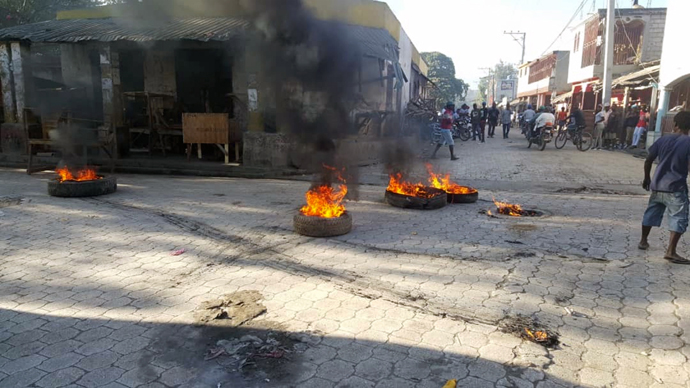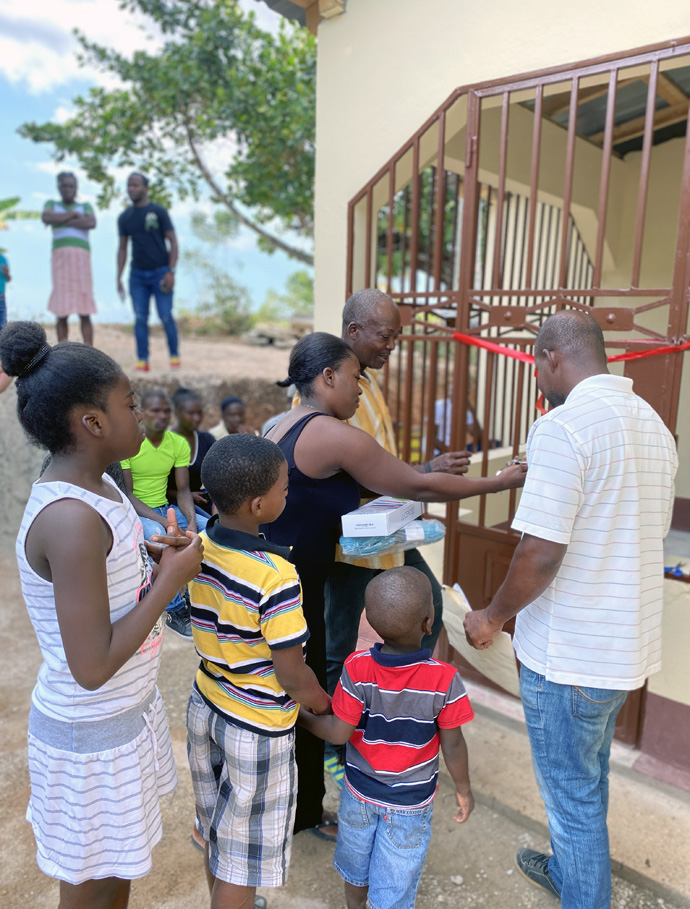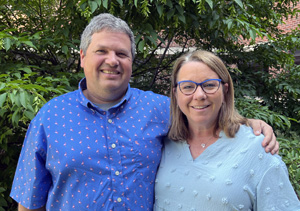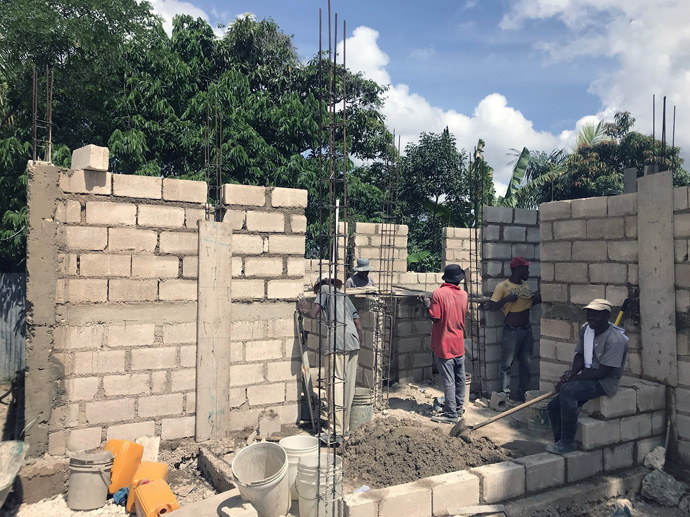Pontos chave:
- Apesar da agitação no país, uma organização de caridade de um casal Metodista Unido continua a ajudar a construir casas para membros de uma comunidade rural e montanhosa.
- Os Rev. David e Jamalyn Peigh Williamson, pastores em Indiana, fundaram a Zanmi Fondwa depois de viverem no Haiti por dois anos.
- O terremoto de 2010 suspendeu as visitas, mas a construção de casas continuou porque os haitianos estão encarregados dos projetos de construção da Zanmi Fondwa. Quase 80 casas foram construídas até agora, e mais de 100 famílias adicionais estão na lista para conseguir uma casa.
O Departamento de Estado dos EUA sugeriu fortemente que os americanos permanecessem fora do Haiti devido à criminalidade violenta, à agitação civil e à fraca infraestrutura de cuidados de saúde.
Mas os Metodistas Unidos dos EUA ainda estão no ministério com o povo do Haiti.
“Crimes violentos, muitas vezes envolvendo o uso de armas de fogo, como assaltos à mão armada, roubos de carros e sequestros para resgate que incluem cidadãos dos EUA, são comuns”, alerta um site do governo. “Protestos, manifestações, queima de pneus e bloqueios de estradas são frequentes, imprevisíveis e podem tornar-se violentos.”
Contraponha isso com as palavras da Revda. Jamalyn Peigh Williamson, que viveu com o marido de 2003 a 2005 no país caribenho. O casal voltou frequentemente como parte da Zanmi Fondwa, sua organização de caridade que ajuda a construir casas para haitianos.
“Sinto-me muito atraído pelo Haiti porque há um calor e uma hospitalidade que os haitianos partilham naturalmente”, disse Williamson. “As pessoas que levamos em viagens… realmente se sentem bem-vindas e amadas. Acho que é por isso que é tão difícil para mim ver o que está acontecendo, porque as fotos e imagens que saem do Haiti neste momento não se parecem com nada que eu conheça.”

Pneus em chamas podem ser vistos nas ruas de Hinche, no centro do Haiti, em 11 de fevereiro de 2019. Os protestos que começaram em cidades de todo o Haiti em 7 de julho de 2018, em resposta ao aumento dos preços dos combustíveis, continuaram por mais de 5 anos, tornando o trabalho missionário difícil. Foto de arquivo de R. Ambroise, Voice of America, cortesia do Wikimedia Commons.
O Haiti está em desordem depois de anos de reveses. O presidente Jean-Bertrand Aristide, o primeiro presidente democraticamente eleito do país, foi para o exílio em 2004, após uma rebelião violenta. Seguiu-se uma série de desastres naturais, incluindo uma tempestade tropical que resultou em deslizamentos de terra e inundações, três furacões desde 2008 e um terremoto de magnitude 7,0 em 2010, o terremoto mais grave do Haiti em 200 anos. Então, em 2021, o presidente Jovenel Moïse foi assassinado e a situação tornou-se “incrivelmente tensa”, disse Williamson.
A violência das gangues e um surto de cólera mataram milhares de haitianos e há uma contínua escassez de alimentos e medicamentos.
“Faço parte deste grupo que diz: 'Podemos, por favor, parar de dizer que as coisas no Haiti estão tão ruins?'”, disse Williamson. “O que deveríamos dizer é que as coisas em Porto Príncipe estão muito ruins'”, disse ela sobre a capital do país. “Porque não é o país inteiro, é aquela região, e as pessoas simplesmente juntam tudo.”
Williamson é pastora de conexões na Igreja Metodista Unida de Zionsville em Zionsville, Indiana, onde seu marido, o Rev. David Williamson, é pastor sênior.
Há duas décadas que ajudam a construir casas em Fondwa, uma comunidade rural e montanhosa na parte sudeste do país, através de Zanmi Fondwa. A comunidade Fondwa tem uma população de cerca de 9.000 habitantes em uma área de 10 milhas quadradas.

Uma família haitiana se prepara para inspecionar sua nova casa, construída com a ajuda de Zanmi Fondwa, um projeto missionário liderado pelos Revs. David e Jamalyn Peigh Williamson, pastores em Indiana. Quase 80 casas foram construídas até agora. Foto cortesia de Zanmi Fondwa.
O terremoto de 2010 suspendeu as visitas, mas a construção de casas continuou porque os haitianos estão encarregados dos projetos de construção da Zanmi Fondwa.
“O tráfego não está funcionando bem”, disse Luckner Raymond, um haitiano que é diretor de operações haitianas da Zanmi Fondwa. “Os negócios (no Haiti) não estão funcionando bem por causa de muitas coisas. As pessoas continuam brigando entre si.”
Mesmo antes do terremoto, a maioria dos haitianos vivia em cabanas que vazavam durante as duas estações chuvosas anuais e não tinham eletricidade ou encanamento interno, disse a Irmã Claudette Prevot, freira franciscana das Irmãs de Santo Antônio de Fondwa, que ajuda a administrar um orfanato, escola primária, escola profissionalizante, clínica médica e grupo de mulheres da região.
“Mesmo antes do terremoto, por serem muito pobres, não tinham dinheiro para construir uma casa”, disse Prevot. Agora que alguns têm casas livres de vazamentos, “têm de pensar em novos sonhos quando não estão a tentar limpar a água”.

Zanmi Fondwa construiu 78 casas, o que representa cerca de um terço da sua lista inicial de 217 famílias que necessitam de uma. As novas casas não têm vazamentos e têm canalização interior, mas não têm electricidade e os residentes precisam de transportar água todos os dias porque não há serviços públicos em Fondwa.
“Eles podem encher o vaso sanitário com um balde de água e dar descarga em uma fossa séptica ou no chuveiro com um balde de água dentro”, disse Buffy Perkins, diretora de operações da Zanmi Fondwa. “Seria preciso ter eletricidade para ter uma bomba para levar a água para o banheiro, e ainda não chegamos a esse ponto. Então fizemos também 78 cisternas de água.”
Os Williamson se conheceram quando eram estudantes na Duke Divinity School e se casaram em 2003. Como parte de um curso de “Cura no Terceiro Mundo” na Duke, eles passaram uma semana no Haiti. Sete meses depois de se casarem, eles voltaram e se estabeleceram em Fondwa, onde fizeram contatos que serviram de base para Zanmi Fondwa, ou Amigos de Fondwa.
“Dave ensinou inglês na escola (St. Antoine), e essa é uma grande chave para toda essa história, porque Luckner foi um de seus melhores alunos”, disse Jamalyn Williamson. “Fiz trabalho administrativo na escola.”
“Quando fomos ao Haiti pela primeira vez, não tínhamos esta imagem de... isto é o que faremos 20 anos depois”, disse David Williamson. “Não percebemos isso na época, mas já estávamos plantando sementes para o que eventualmente aconteceria.”
A maior parte do pessoal principal que contrataram inicialmente eram ex-alunos que ele havia ensinado anos antes e com quem o casal havia feito amizade. De forma semelhante, a maior parte do apoio inicial de doadores que receberam veio das congregações de Indiana onde serviram. Quando começaram a levar pessoas em viagens missionárias ao Haiti, não imaginaram que, 10 anos depois, esses mesmos membros da igreja os estariam ajudando a financiar uma organização sem fins lucrativos.
“Eles se tornaram as pessoas que nos cercaram e tornaram esse sonho realidade”, disse David Williamson.
Assine a nossa nova newsletter eletrônica em espanhol e português UMCOMtigo
Você gosta do que está lendo e quer ver mais? Inscreva-se para receber nosso novo boletim eletrônico da UMCOMtigo, um resumo semanal em espanhol e português, com notícias, recursos e eventos importantes na vida da Igreja Metodista Unida
Todas as sementes plantadas ao longo do caminho juntaram-se “para criar esta coisa maravilhosa”, disse ele. “Para mim, vejo a mão de Deus em tudo isso.”
Fondwa não tem uma Igreja Metodista, mas depois do terremoto de 2010, os Williamsons notaram o logotipo da Igreja Metodista Unida em várias casas recém-construídas. Mais tarde, souberam que o Comitê Metodista Unido de Alívio (UMCOR, na sigla em inglês) tinha financiado a construção de cerca de 50 pequenas casas na comunidade após a catástrofe.
Jamalyn Williamson estava no Haiti durante o terremoto. Ela não se machucou fisicamente, mas precisou de um ano de terapia para lidar com o transtorno de estresse pós-traumático devido à experiência.
“Vi em primeira mão a destruição e temos tantos amigos e pessoas (em Fondwa) em quem confiamos, por isso foi o primeiro lugar onde pensamos que iríamos começar”, disse Jamalyn Williamson. “Quando começamos a ajudar, eles confiaram em nós.”
O plano é continuar construindo casas em Fondwa até que a necessidade seja atendida antes de mudar para outra comunidade.
Por causa dos distúrbios no Haiti, os americanos não estão no local desde 2021. Fondwa é seguro, mas não há uma maneira confiável de ir de Porto Príncipe a Fondwa sem passar pelo território de gangues, disse David Williamson.

A construção de casas não foi afetada porque os haitianos podem fazer o trabalho desde que tenham os materiais de que necessitam.
“Nossa organização é totalmente dirigida no Haiti por haitianos”, disse Perkins. “Nós apenas aconselhamos e supervisionamos o que eles estão fazendo. As operações diárias estão totalmente nas mãos de Luckner. É exclusivo para muitas organizações que trabalham com ajuda humanitária.”
¿Cómo ayudar?
Zanmi Fondwa está buscando socios que quieran entablar relaciones con las familias allí, dijo la Revda. Jamalyn Peigh Williamson.
"No solo estamos abordando una necesidad sino que podemos conectar a las personas con una historia y una familia de una manera más personal y... con suerte, más duradera" dijo el Rev. David Williamson.
Para obtener más información sobre Zanmi Fondwa o hacer una donación, haga clic aquí para visitar su sitio web.
A maior parte dos materiais de construção das casas é adquirida de empresas haitianas, o que ajuda as empresas e elimina as dificuldades de importação de produtos para o Haiti.
“É uma situação em que todos ganham porque os fornecedores também estão ganhando dinheiro”, disse Perkins.
Zanmi Fondwa é o maior empregador em Fondwa.
“Temos cerca de 125 funcionários que trabalham diretamente para nós ou por meio de contrato”, disse Jamalyn Williamson.
Espera-se que as famílias que recebem as casas contribuam com mão-de-obra durante a construção e paguem uma quantia razoável para cobrir os custos, embora não o suficiente para realmente pagar por isso. Eles têm aulas para aprender como limpar e manter as casas adequadamente.
“Precisamos dar-lhes algumas instruções sobre como trancar as portas porque eles não sabem como usar a fechadura”, disse Raymond. “Antes, quando saíam, precisam colocar o dinheiro no bolso porque acham que se saírem de casa sem ele pode vir outra pessoa buscar o dinheiro.”
“Então, agora a vida está mudando.”
Prevot será fundamental na decisão da próxima comunidade onde Zanmi Fondwa construirá casas. Jamalyn Williamson disse que a instituição de caridade em breve mudará seu nome para Project Rouge, em homenagem aos telhados vermelhos característicos das casas que constroem.
“Irmã Claudette é realmente a chave para mudarmos para uma nova comunidade porque ela é a diretora espiritual das Irmãs de Santo Antônio de Fondwa”, disse Jamalyn Williamson. “Eles trabalham fora de Fondwa, então provavelmente nos mudaremos para uma comunidade onde eles já servem por causa da confiança e da confiabilidade na forma como ela conhece as famílias.
“A chave são os relacionamentos lá embaixo. Nós nos concentramos primeiro nos relacionamentos e depois nos concentramos no trabalho.”
* Patterson é repórter da Notícias MU em Nashville, Tennessee. Contate-o pelo telefone 615-742-5470 ou newsdesk@umcom.org. Para ler mais notícias Metodistas Unidas, assine gratuitamente os resumos quinzenais.
** Sara de Paula é tradutora independente. Para contatá-la, escreva para IMU_Hispana-Latina@umcom.org.




